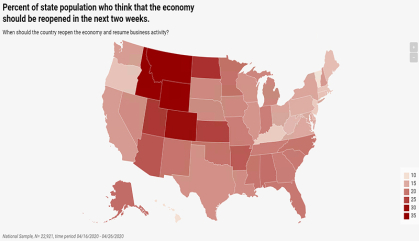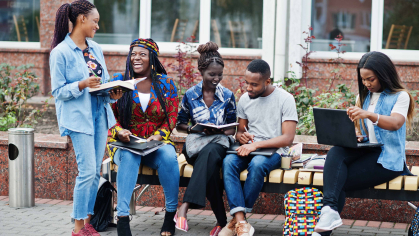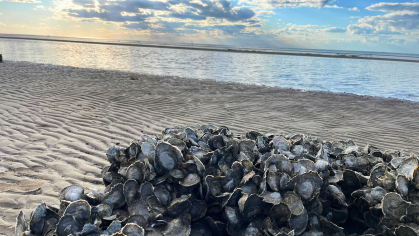New Survey Finds U.S. Public ''Firmly Opposed'' To Reopening Economy Immediately
Survey offers insights into public opinion amidst the coronavirus pandemic
A majority of people in the United States want to continue physical distancing measures even as the federal government and some governors are pushing to re-open the economy, according to a new national survey led by researchers from Rutgers University–New Brunswick, Northeastern and Harvard.
The survey, published Thursday, also reveals that more people trust scientists and scientific institutions to handle the COVID-19 pandemic than federal authorities or news media; and as governors take the lead on managing the crisis, they have become more popular among their constituents than President Trump, who has handed much of the individual management over to the states.

The researchers surveyed nearly 23,000 people across all 50 states and the District of Columbia between April 17 and April 26. The answers they received revealed that the attitudes of Americans, divided on many political and social issues facing the country, have united during this unprecedented crisis.
"As this health crisis develops over time, public opinion shifts quickly,” said Katherine Ognyanova, an assistant professor of communication at the Rutgers’ School of Communication and Information. “The same is true of the challenges people face—health-related, economic, technological and social.”
Despite the financial hardships facing people across the country, 93 percent of Americans do not think the economy should reopen immediately—even in states that are currently moving in that direction.
Ninety six percent of respondents reported “some” or “a lot” of trust in hospitals and doctors to do the right thing in handling the COVID-19 outbreak. Ninety three percent said the same about scientists and researchers, and 88 percent about the Centers for Disease Control and Prevention.
“In a time when expertise seemed undervalued, Americans in our survey report extremely high levels of trust in experts,” said Ognyanova. “Republicans and Democrats in the data differ in how much they trust political and media institutions. It is encouraging, therefore, that trust in medical professionals, scientists and the CDC is high across party lines.”
Political actors ranked lower, although those surveyed had significantly more trust in their state government, with 81 percent responding “some” or “a lot”, than in the White House (59 percent) or Congress (57 percent). Trust in Trump to handle the outbreak was split almost down the middle, with 51 percent of respondents saying they had “some” or a “a lot” of trust in the president and 49 percent answering “none” or “not too much”.
“Trump especially is such a polarizing figure,” said David Lazer, University Distinguished Professor of political science and computer and information sciences at Northeastern. “But it is notable that his approval on the coronavirus is below that of every governor in every state.”
The survey did reveal partisan divisions in regards to how long states should wait before trying to resume business as usual. Republicans tend to support reopening the economy somewhat sooner than Democrats: 18 percent of Republicans said in the next two weeks, 22 percent said after two to four weeks, 20 percent said after four to six weeks, 13 percent said six to eight weeks and 16 percent said more than eight weeks. Only 5 percent of Democrats thought the country should reopen the economy in the next two weeks, 13 percent said two to four weeks, 22 percent said four to six weeks, another 22 percent said six to eight weeks and 35 percent said more than eight weeks.
"This study is an attempt to help the public, health experts and policymakers better understand how people across the country are thinking about, living with and responding to the COVID-19 pandemic,” said Matthew Baum, Marvin Kalb Professor of Global Communications at Harvard Kennedy School. “Our hope is that doing so will contribute to more effective communication with the public and ultimately more effective public policy decision-making.”
The researchers intend to repeat the survey every other week.
For more information, visit: covidstates.org.
See how Rutgers is making a difference during the COVID-19 crisis.


